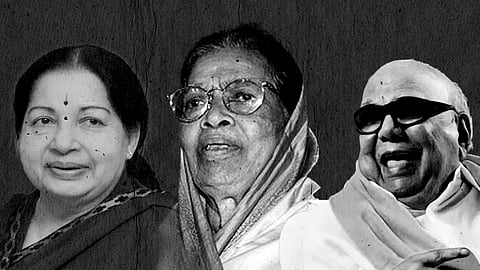

Former Supreme Court judge M Fathima Beevi had several accomplishments to her name in the legal arena. But her political stint as the Governor of Tamil Nadu from 1997 to 2001 was a tumultuous one. Sworn as the Governor of Tamil Nadu on January 25, 1997, her peaceful term was shaken in May 2001, when the All India Anna Dravida Munnetra Kazhagam (AIADMK) led by J Jayalalithaa won the Assembly elections by a landslide defeating their main rivals, Dravida Munnetra Kazhagam (DMK).
What made the swearing-in more curious was that Jayalalithaa was then convicted in a land scam case by a special court in October 2000. According to the Representation of People Act, any person convicted for certain crimes or a term of more than two years is disallowed from contesting elections for six years. However, barely eight months after her conviction, the then Governor Fathima Beevi invited her to become the CM, even though Jayalalithaa did not contest the election.
How did she do it?
Fathima Beevi invoked Article 164 of the Constitution. This allows a non-member of the state Legislature to become the Chief Minister, accepting Jayalalithaa’s claim that she had “the will of the people.” Fathima swore in Jayalalithaa as the Chief Minister on May 14, 2001.
Fathima Beevi’s act of inviting Jayalalithaa to become the next CM was also a shocker to the rival party DMK. It was DMK supremo M Karunanidhi, who batted for her appointment as the Governor. In 1997, Karunanidhi had specifically requested the appointment of Fathima as the state’s Governor. The party’s then general secretary, K Anbazhagan, said, “Her tone changed soon after we got defeated in the elections.”
Jayalalithaa came out in support of Beevi and said, "Fathima Beevi is a retired judge of the Supreme Court. Nobody needs to teach her law."
The Supreme Court later slammed Fathima for her reading of the Constitution in a way that appointed Jayalalithaa as the CM and stated that it went against the Constitution. The court also called her justification that it was “the will of the people” as an “absurd interpretation” of the Constitution.
“Such a dangerous, such an absurd interpretation of Article 164 has to be rejected out of hand. The Constitution prevails over the will of the people as expressed through the majority party. The will of the people as expressed through the majority party prevails only if it is in accord with the Constitution,” the SC said.
Why was Fathima recalled?
On July 2, 2001, Fathima Beevi resigned from the post of Governor after the Union cabinet decided that she failed to discharge her constitutional duties. The resignation came in the wake of the storm she faced after the arrest of DMK leader Karunanidhi. On the night of June 30, 2001, the nation was shocked to see visuals of the rival party leader, who was then 78 years old, being dragged away from his house in Gopalapuram by the Tamil Nadu police. These visuals are still portrayed by the party claiming that it was an attempt by Jayalalithaa to settle scores with Karunanidhi for her conviction in the land scam case.
The Union government had sought a report of the incident from Fathima Beevi. She gave a clean chit to the police in her report. The then ruling NDA government found it unsatisfactory and not reflecting reality. Union Law Minister Arun Jaitley said that the Governor "wholly failed to discharge her constitutional obligations," and the Cabinet had recommended the immediate recall of the Governor. He also said that “Fathima Beevi has failed totally" in the Governor’s obligation to keep the President and the Union informed of all significant political developments in the state.
Jaitley said the report indicated that she did not make any “independent and objective assessment of the situation in the state, but merely forwarded the views of the state government."
"In fact, several portions of her report are a verbatim reproduction of the report that the chief secretary has sent and that is flagrant defiance of the worst kind," he said. The Frontline reported that the Governor’s recall came amidst the backdrop of rumours that she might grant pardon to Jayalalithaa in the land scam case.
Though Fathima Beevi released a statement about her resignation, she remained silent about the criticism against her. In her statement dated July 2, 2001, she said, "Politicians can trade charges and retaliate but a Governor cannot, at any point of time, seek to justify his acts being done in accordance with the Constitution and the law in the normal course of discharge of duties," and thanked the President and the Government of India for the opportunity to serve the people of Tamil Nadu.
Join TNM and Newslaundry as we bring to you the most compelling reporting and analysis during the upcoming elections in Telangana, Mizoram, MP, Chhattisgarh, and Rajasthan. Click here to support our election coverage.